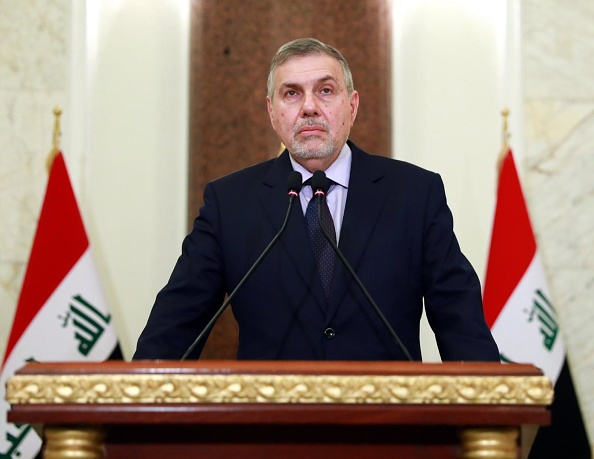ALI LARIJANI VISITS NEW GOVERNMENT IN BEIRUT
After about three months of continuing protests, Lebanon finally formed a new government with Hassan Diab as the successor for outgoing Prime Minister Saad Hariri. However, this new government will likely face the same problems as the first one. Like its predecessor, this current government will not likely challenge the authority of Hezbollah, Iran’s proxy in Lebanon. This will not satisfy the protestors who after the resignation of Hariri, chanted “Everyone means everyone” a clear reference to everyone who holds authority in the country including Hassan Nasrallah and his forces. The current economic crisis has also put the new government in a precarious position, in the past whenever Lebanon faced looming economic difficulties foreign powers such as the Arab Gulf states, or the US would provide the government bailout packages which would buy the government more periods of relative stability. The most famous example of this was after the 2006 Israel–Hezbollah War when the Gulf states provided Lebanon with funds to rebuild the war-torn country. However, this time the Gulf states (with the exception of Qatar) have stated that they will not be aiding a Hezbollah backed government. The US and EU have also had their own separate sentiments towards providing loans to the new government, and recent actions on the government’s part have further soured the international community’s feelings towards it.
Two major events in Lebanon this week have indicated that Tehran is still an influential foreign power in Beirut. First and foremost, there was Ali Larijani’s, the Iranian Speaker of Parliament, meeting with the new Prime Minister in Beirut. This was significant because Larijani is the first foreign official to visit Lebanon since it formed its new government. Furthermore, in his visit, Larijani also met with Lebanese President Michel Aoun and expressed how Tehran could help Lebanon develop its engineering capabilities to resolve its power problems. He also expressed the importance of parliamentary cooperation between both governments and also handed Aoun a letter from Rouhani stating that he seeks an expansion of the ties that already exist between both governments. Additionally, Hezbollah did another provoking move this week as it unveiled a statue of Qassem Soleimani in Maroun Al-Ras, triggering criticism from Lebanese citizens and political leaders who are against Tehran’s influence in the country. In response to the unveiling, May Chidiac Former Minister of Administrative Reform angrily tweeted “Are we in Lebanon or Iran? Unveiling a statue of #Soleimani & naming an avenue after #Khomeini proves that Hezbollah is an arm of the Iranian Revolutionary Guards & a subsidiary of Vilayat Faqih!” These two events will not likely bode well with the US government, which has been at odds with the Islamic Republic and its regional activities.

IRAN OFFERS SUPPORT FOR NEW IRAQI GOVERNMENT
Baghdad has been facing a similar crisis to that of Beirut. Since October of last year, Iraqis have taken to streets protesting against government corruption, unemployment and foreign intervention of domestic affairs. One of the significant elements of this demonstration is how openly anti-Tehran the protestors are, while anti-Islamic Republic sentiment is not new in Iraq this is the first time since that Iraqis are expressing anger towards the Islamic Republic’s influence in their domestic affairs. Photos and videos of Iraqis burning Iranian flags made headlines across the globe, things came to a head in late November/early December when anti-government protestors in Najaf, southern Iraq set fire to the Iranian consulate twice in one week chanting “Iran out of Iraq”.
The protests caused Adil Abdul-Mahdi to resign from his position as Prime Minister, while former Minister of Communications Mohammed Tawfiq Allawi has been chosen as the new Prime Minister-designate. Iran has been quick to welcome Allawi’s appointment, as Iranian Foreign Ministry spokesman Abbas Mousavi was one of the first foreign officials to voice approval for Allawi’s new position. Nevertheless, Alllawi still faces a major uphill battle of winning a vote of confidence from parliament after he appoints ministers and forms a new government. Thus far, many factions within the Council of Representatives have indicated that they are not supportive of Allawi, so far only the Fatah and Sairoon alliance have voiced support for Allawi, the former bloc is well known for its pro-Tehran stances. To secure premiership, Allawi will need support from other blocs particularly Sunni and Kurdish blocs. If Allawi becomes Prime Minister, then the Islamic Republic will expect it to act on its behest, this was made evident in Mousavi’s statement which clearly indicated that the regime expects Allawi to expel US forces from Iraq.
PROTESTORS CARRY ON
Citizens from both Lebanon and Iraq have made it evident that they are no longer going to tolerate foreign intervention in their country’s policies. As long as proxies for foreign governments remain in power in Iraq and Lebanon, then protests in the street will likely continue. As it stands, things seem bleak for the people of both Iraq and Lebanon, and while new governments are forming in both states the ongoing protests will most likely render these governments impotent.









